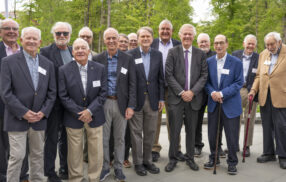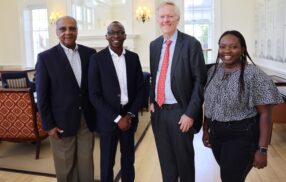
HWZ and UVA Darden School Host Big Data: Little Ethics? Conference
By Julie Daum
Every digital interaction today contributes to the deluge of information known as Big Data, which — if mined correctly — brims with the potential to deliver meaningful insights and value for businesses. Yet Big Data also brings with it important challenges. How should the data, much of it private information, be collected, managed and shared, and what are the ethical and legal implications?
Hochschule für Wirtschaft Zürich (HWZ) at the University of Applied Sciences in Business Administration Zurich and the University of Virginia Darden School of Business hosted the conference Big Data: Little Ethics?at HWZ’s campus in Zurich, Switzerland, on 4 June to address those challenging questions.
THE INTERNET OF THINGS
“When we talk about data, the idea is how to use data responsibly,” said Darden Professor Raj Venkatesan, who led a session on the Internet of Things (where hardware and software connect) and described how various companies are monetizing data products. As a fast-moving stream of new gadgets deliver personalized information on health, fitness, home temperature and driving habits, Venkatesan cautioned companies aspiring to create new products to stick to marketing fundamentals: what are the benefits, for whom and why?
“Build a business by offering a valuable service that the customer is willing to pay for,” he said.
Marcel Blattner, course director of CAS Disruptive Technologies, said that — despite the hype — we should care about Big Data because “it forces you to think differently, offers the chance for interdisciplinary work, to rethink your organization, generate competitive advantage and lead to a better understanding of our world.”
The process of data analysis, he noted, is often oversimplified. It takes a skilled team, including data scientists, analysts and communicators, to successfully extrapolate accurate information that can be of strategic use to a company.
THE DANGERS OF THE ONLINE WILD WEST
 Darden Professors Ed Freeman and Bobby Parmar engaged the audience of executives through two case studies, which posed the delicate question of whether companies should buy information for a competitive edge.
Darden Professors Ed Freeman and Bobby Parmar engaged the audience of executives through two case studies, which posed the delicate question of whether companies should buy information for a competitive edge.
“What might be the harms of this promising technology?” asked Parmar. “Big Data is new; it’s like the Wild West. Do we have the right regulations, systems and procedures to guide us?”
They urged the audience to put ethics front and center. Freeman reflected on the true purpose of business, which started in towns as a social phenomenon, to create value for stakeholders and communities.
“We stand on the verge of technology that does nothing less than change who we are as human beings,” said Freeman. “I do think we have to ask: How does technology affect how we think about each other? About how we care for and love each other? Business has an obligation to be involved in that conversation. That’s the only way we can make businesses better: to make them institutions of hope.”
RULES (EVEN THE OLD ONES) STILL MATTER
Professor Karl Schmedders of the University of Zurich addressed the opportunities and limitations of Big Data. He urged the audience to find facts amid the increasing noise and cited several examples of sample bias, where an analyst had the right formula but the wrong data. He emphasized that the “old rules” of scientific rigor and statistics still matter. “N = all is wishful thinking,” he said, citing a quote from British economist Ronald H. Coase: “If you torture the data long enough, it will confess.”
The data are plentiful. Every 24 hours, 92,000 news articles are published online, 3 million new blog posts, 55 million new Facebook status updates and 500 million new tweets, said Fabrizio Gilardi, associate professor at the University of Zurich. And often, there is a story within the words. For example, U.S. political parties might analyze Twitter to better understand voter sentiment.
Another startling fact concerns identity: To identify 89 percent of U.S. citizens, it takes only a birth date, gender and a postal code, said Roland Mathys, partner in Schellenberg Wittmer’s Information and Communication Technology and Intellectual Property Group, who addressed the legal aspects of Big Data. He called this the “legend of anonymization.” He also shattered the “myth of consent.” When consumers fill out a form online, they rarely know exactly what they are consenting to.
To address legal concerns, Mathys pointed out several emerging approaches worth following, including data ownership, profiling restrictions, certification and a new balance between the benefits of big data and data protection.
The Big Data: Little Ethics? conference was sponsored by Accenture and the Swiss marketing organization GFM. The media partner was Handelszeitung. HWZ and the Darden School have a longstanding partnership.
The University of Virginia Darden School of Business prepares responsible global leaders through unparalleled transformational learning experiences. Darden’s graduate degree programs (MBA, MSBA and Ph.D.) and Executive Education & Lifelong Learning programs offered by the Darden School Foundation set the stage for a lifetime of career advancement and impact. Darden’s top-ranked faculty, renowned for teaching excellence, inspires and shapes modern business leadership worldwide through research, thought leadership and business publishing. Darden has Grounds in Charlottesville, Virginia, and the Washington, D.C., area and a global community that includes 18,000 alumni in 90 countries. Darden was established in 1955 at the University of Virginia, a top public university founded by Thomas Jefferson in 1819 in Charlottesville, Virginia.
Press Contact
Molly Mitchell
Associate Director of Content Marketing and Social Media
Darden School of Business
University of Virginia
MitchellM@darden.virginia.edu





